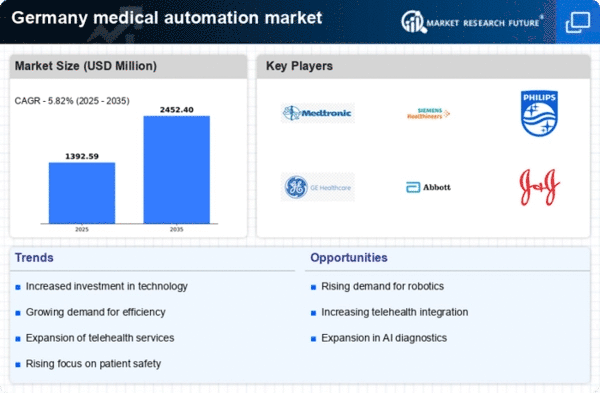Government Initiatives and Funding
Government initiatives in Germany are playing a pivotal role in the advancement of the medical automation market. The German government has allocated substantial funding to support the integration of innovative technologies in healthcare. In 2025, public investments in health technology are projected to reach €1 billion, aimed at fostering research and development in automation solutions. These initiatives are designed to improve healthcare delivery and accessibility, particularly in rural areas. By promoting automation, the government seeks to enhance the efficiency of healthcare services, reduce costs, and ultimately improve patient outcomes. This supportive regulatory environment is likely to encourage further investment from private sectors, thereby accelerating the growth of the medical automation market.
Focus on Patient-Centric Care Models
The shift towards patient-centric care models is reshaping the medical automation market in Germany. Healthcare providers are increasingly prioritizing patient engagement and personalized treatment plans, which necessitate the integration of automation technologies. By 2025, it is anticipated that 60% of healthcare facilities will implement automated systems to enhance patient interactions and streamline care processes. Automation tools, such as patient portals and automated appointment scheduling, are becoming essential in fostering better communication between patients and providers. This focus on patient-centricity not only improves satisfaction but also enhances treatment adherence, ultimately leading to better health outcomes. The medical automation market is thus evolving to meet the demands of a more engaged patient population.
Rising Demand for Efficiency in Healthcare
The medical automation market in Germany is experiencing a notable surge in demand for efficiency within healthcare systems. As healthcare providers strive to enhance operational workflows, automation technologies are increasingly being adopted. This trend is driven by the need to reduce human error and improve patient outcomes. In 2025, it is estimated that the market will grow at a CAGR of approximately 10%, reflecting the urgency for streamlined processes. Automation solutions, such as electronic health records and automated medication dispensing systems, are becoming essential tools for healthcare facilities. The integration of these technologies not only optimizes resource allocation but also allows healthcare professionals to focus more on patient care, thereby enhancing overall service delivery.
Technological Advancements in Medical Devices
Technological advancements in medical devices are propelling the growth of the medical automation market in Germany. Innovations such as smart medical devices, AI-driven diagnostic tools, and automated surgical systems are transforming traditional healthcare practices. In 2025, the market for automated medical devices is expected to reach €3 billion, reflecting the increasing reliance on technology to enhance patient care. These advancements not only improve the accuracy of diagnoses but also facilitate minimally invasive procedures, leading to quicker recovery times for patients. As healthcare providers continue to adopt these cutting-edge technologies, the medical automation market is likely to witness substantial growth, driven by the demand for improved healthcare outcomes.
Aging Population and Increased Healthcare Needs
Germany's aging population is significantly influencing the medical automation market. As the demographic shifts towards an older population, the demand for healthcare services is escalating. By 2025, it is projected that over 25% of the population will be aged 65 and above, necessitating more efficient healthcare solutions. Automation technologies, such as robotic assistance and telehealth services, are becoming increasingly vital in managing chronic conditions and providing care for the elderly. This demographic trend is likely to drive the adoption of automation in healthcare settings, as providers seek to meet the growing needs of an aging population while maintaining quality care. The medical automation market is thus positioned to expand in response to these demographic challenges.
















